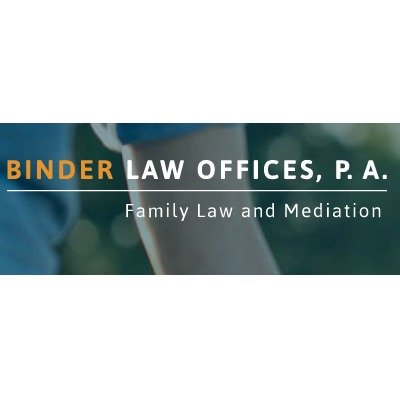Best Family Lawyers in Minnesota
Share your needs with us, get contacted by law firms.
Free. Takes 2 min.
Free Guide to Hiring a Family Lawyer
Or refine your search by selecting a city:
List of the best lawyers in Minnesota, United States
United States Family Legal Questions answered by Lawyers
Browse our 2 legal questions about Family in United States and read the lawyer answers, or ask your own questions for free.
- Confirming the authenticity of a divorce decree
- I'm married to a Nigerian, and I believe he provided a fake divorce decree, I need help to confirm this decree.
-
Lawyer answer by Nomos Legal Practice
Thank you and best regards, Kingsley Izimah, Esq. SK Solicitors
Read full answer - Child support laws
- If my annual salary is 4 million pesos my wife's salary is 240,000 pesos, and she lives in Rizal, how much will I pay in child support for one child?
-
Lawyer answer by Rana Fazal Muhammad Law Associates
it is the discretionary power of the court to determine the amount for the support of your child, it is not fixed amount
Read full answer
United States Family Legal Articles
Browse our 4 legal articles about Family in United States written by expert lawyers.
- Fighting Custody in Texas: US 2026 Rules for Non-Parents
- Texas has tightened "standing" rules for non-parents in child custody cases: many step-parents and grandparents who used to qualify can no longer file custody suits. Non-parents must now often show they had exclusive care and control of the child for a period of time, not just that they helped raise... Read more →
- Texas Child Support Cap 2026 - Calc Rules
- Texas raises the child support "net resources" cap from about $9,200 to about $11,700 per month starting September 1, 2025, which significantly increases guideline support for higher income parents. For 1 child, the guideline maximum jumps from about $1,840 to around $2,340 per month; for 2 children, from about $2,300... Read more →
- Divorce and Crypto in the United States 2026: Valuing Assets
- Family Law in the United States: Divorce, Crypto, and Complex Assets Family law in the United States is mostly state-specific, but federal tax rules (IRS) heavily affect how you divide assets like crypto, stock, and retirement accounts. Crypto acquired during the marriage is usually marital property, subject to division like... Read more →
About Family Law in Minnesota, United States
Family law in Minnesota covers a wide range of legal matters involving family relationships. These matters include marriage, divorce, child custody, child support, paternity, adoption, domestic abuse, and other related legal issues. The goal of family law is to settle disputes fairly while ensuring the well-being and protection of any children involved, and to safeguard the rights of all parties. Minnesota family law is governed by a combination of state statutes, local rules, and court decisions.
Why You May Need a Lawyer
There are numerous situations where individuals may require the help of a family law attorney in Minnesota. Some of the most common scenarios include:
- Filing for divorce or legal separation
- Negotiating child custody and visitation rights
- Determining or contesting child support and spousal maintenance
- Establishing paternity
- Addressing concerns about domestic violence or seeking protective orders
- Handling adoptions or foster care issues
- Modifying or enforcing court orders, including those relating to custody or support
- Navigating complex asset or property division in divorce
- Drafting or reviewing prenuptial and postnuptial agreements
- Seeking mediation or alternative dispute resolution options
Family law matters can be highly emotional and complex. A lawyer can provide guidance, advocate on your behalf, ensure your rights are protected, and help you navigate complicated court procedures.
Local Laws Overview
Family law in Minnesota is primarily governed by Minnesota Statutes Chapters 518 (Marriage Dissolution), 518A (Child Support), 257 (Parentage), and 518B (Domestic Abuse Act), among others. Key aspects include:
- No-fault divorce: Minnesota is a no-fault divorce state, meaning you do not need to prove wrongdoing to file for divorce. "Irretrievable breakdown" of the marriage is sufficient.
- Child custody: The courts decide custody based on the best interests of the child, taking into account factors such as parental cooperation, the child's wishes (depending on age), and the child's adjustment to home, school, and community.
- Child support: Minnesota uses an "income shares" model to calculate child support, considering both parents' incomes, the number of children, and parenting time.
- Property division: Minnesota follows the "equitable distribution" principle, meaning assets and debts are divided fairly, though not necessarily equally.
- Spousal maintenance: This is awarded based on one spouse's need and the other’s ability to pay, considering factors such as length of marriage, standard of living, and earning capacity.
- Domestic violence: Victims can seek Orders for Protection (OFPs) against alleged abusers. The court handles these matters swiftly and with a focus on safety.
- Paternity: Establishing paternity gives a man legal rights and responsibilities as a father, which can include custody, parenting time, and child support.
Frequently Asked Questions
What are the grounds for divorce in Minnesota?
Minnesota is a no-fault divorce state. The only ground required is an "irretrievable breakdown" of the marriage. You do not need to prove wrongdoing or fault by your spouse.
How does the court determine child custody?
The court bases custody decisions on the best interests of the child, evaluating several factors such as the child's needs, parental ability, child’s preference (if of suitable age), and the parent's willingness to cooperate.
How is child support calculated in Minnesota?
Child support is calculated using an income shares formula, which takes into account both parents' earnings, the number of children, and the amount of parenting time each parent has.
What is the difference between legal and physical custody?
Legal custody refers to the right to make important decisions regarding the child’s upbringing, including education and healthcare. Physical custody refers to where the child lives and the daily care provided.
How are assets divided in a divorce?
Minnesota courts divide marital property based on what is fair, taking into account factors such as the length of the marriage, each spouse’s contributions, and the economic circumstances of each party.
What is a parenting plan?
A parenting plan outlines how parents will share time with their child and make decisions about their welfare. Minnesota courts often require a detailed parenting plan during custody proceedings.
Can custody or child support orders be changed?
Yes. Orders can be modified if there is a significant change in circumstances, such as a change in income, relocation, or the needs of the child.
What legal protections exist for victims of domestic violence?
Victims can request an Order for Protection (OFP), which may provide restraining measures, custody provisions, and temporary support. Law enforcement and courts treat these matters with urgency.
How is paternity established in Minnesota?
Paternity can be established voluntarily with both parents' agreement and signing a Recognition of Parentage form, or through court proceedings involving genetic testing.
Is mediation required in Minnesota family law cases?
While not always required, Minnesota courts often encourage or order mediation to help resolve family disputes without litigation, especially concerning custody and parenting time.
Additional Resources
If you need more information or assistance with family law issues in Minnesota, the following resources can be helpful:
- Minnesota Judicial Branch - Family Law Forms and Information
- Legal Aid Societies and Volunteer Lawyer Programs
- Minnesota Department of Human Services - Child Support Division
- County Family Court Self-Help Centers
- Domestic Abuse Service Agencies and Shelters
- Law libraries located at most courthouses across Minnesota
Next Steps
If you believe you need legal help with a family law matter in Minnesota, consider the following steps:
- Start by outlining your situation and collecting any important documents, such as court orders, financial statements, or communications related to your issue.
- Research your options and consult trusted resources, including self-help centers or legal aid services if you cannot afford a private attorney.
- Contact a family law attorney experienced in Minnesota law for a consultation. Many offer free or low-cost initial consultations to discuss your case.
- Prepare questions and goals prior to your meeting to make the most out of your time with the lawyer.
- Follow legal advice and court procedures carefully, and keep documentation of all communications and court filings.
Taking these steps can help ensure your rights and interests are protected as you navigate the complexities of family law in Minnesota.
Lawzana helps you find the best lawyers and law firms in Minnesota through a curated and pre-screened list of qualified legal professionals. Our platform offers rankings and detailed profiles of attorneys and law firms, allowing you to compare based on practice areas, including Family, experience, and client feedback.
Each profile includes a description of the firm's areas of practice, client reviews, team members and partners, year of establishment, spoken languages, office locations, contact information, social media presence, and any published articles or resources. Most firms on our platform speak English and are experienced in both local and international legal matters.
Get a quote from top-rated law firms in Minnesota, United States — quickly, securely, and without unnecessary hassle.
Disclaimer:
The information provided on this page is for general informational purposes only and does not constitute legal advice. While we strive to ensure the accuracy and relevance of the content, legal information may change over time, and interpretations of the law can vary. You should always consult with a qualified legal professional for advice specific to your situation.
We disclaim all liability for actions taken or not taken based on the content of this page. If you believe any information is incorrect or outdated, please contact us, and we will review and update it where appropriate.
Browse family law firms by service in Minnesota, United States
Minnesota, United States Attorneys in related practice areas.
Browse family law firms by city in Minnesota
Refine your search by selecting a city.













